- Software – Amazon, Zoom, Netflix and others supply the needs of the socially distanced world. Our work and social lives have become almost completely dependent on them in the space of a few months, causing their customer base and revenues to soar. Brands in this industry donate overwhelmingly to Democrats, likely reflecting their younger average employee age and common residence in blue states.
- Supermarkets – Now that the panic buying has receded (a bit), grocery stores are still benefiting directly from the dormancy of the restaurant industry. Their growth will be constrained by how well they adapt to contactless buying like curbside pick up and deliveries. Supermarket brands donate across the aisle, for example Amazon’s Whole Foods on the left is balanced by Publix and Kroger on the right. As a quick glance at our Grocery Store category shows, 41 companies give mostly to the left, 43 mostly to the right, 1 gives to both evenly, and 8 do not give to anyone.
- Health Insurance – Cigna, Anthem, and Humana have all seen jumps in their stock price since the beginning of the outbreak. While these 3 companies in particular have pledged to waive patient cost-sharing for COVID related needs, rather than struggling with the increase in claims, their profit margins are widely expected to increase (NPR). These projections come from the expected cancellation of all non-emergency procedures and premium increases in 2021. The industry’s donations trend strongly toward Republicans, finding their way right twice as often as left.
- Sanitation – Brands like Purell, Clorox, and Lysol, as well as other producers of disinfectant and PPE will continue riding the massive surge in demand set off by the pandemic. Demand for hand sanitizer in particular jumped 1,400% between December and January, just to meet the needs of the annual flu season (Vox). Then COVID happened. The major brands in this industry, on average, donate overwhelmingly to Democrats.
- Gambling – Most of this industry has had to close down. Even the non-casino subtypes like betting have been hit by the postponement or cancellation of sports seasons and events like March Madness. The industry’s donations trend strongly Republican. In particular, the biggest individual donor of the 2018 election was Sheldon Adelson of the Las Vegas Sands corporation. All $123 million of his donations went to Republicans (Open Secrets).
- Hardware – China is the world capital of hardware production and its battle with the outbreak has had understandable effects on device-centric businesses. Apple alone has been projected to lose as much as $67 billion due to a shortage of iPhones (USAToday). Tech as an industry trends strongly Democratic. And that political bent holds for the hardware-centric companies.
- Oil & Gas – This industry took the most immediate hit from social distancing and the reduction in all types of travel. Its troubles were exacerbated when COVID pushed Saudi Arabia and Russia, two of the world’s largest oil & gas producers, into a price war. So far this election cycle, oil has donated to Republicans nine times more than to Democrats, reflecting a historic trend for the industry.
- Transportation – The Transportation sector was the most obvious casualty of the pandemic. As a complementary industry, it faces most of the problems Oil & Gas does. Social distancing particularly has set demand back and profits with it. The industry’s political lean has solidified ever since climate change entered the fray as a political issue, setting oil and its complementary industries on one side of the aisle and environmentalists on the other. In keeping with that, Transportation has donated to Republicans four times more often than to Democrats this cycle.
Search Results for "apple"
The COVID-19 pandemic arrived with force just a few months ago. And it has quickly become a global emergency that few, if any, have ever experienced before.
At Goods Unite Us, our mission is to provide transparency and allow consumers to shop according to their political beliefs.
As an app and website company, however, we initially had a difficult time thinking of ways we could help. After all, we don’t make ventilators, masks . . . or toilet paper. But then we realized that through our website and platforms, we could tell our users about those companies and brands that have stepped up to help the fight.
Below is our list of COVID DEFENDERS. We’ve also created a COVID RESPONDERS category in our app. Just click on a company/brand to see more details about their heroic actions.
We will update these lists every day until we beat the virus.
Companies Making Masks
Companies Making Ventilators
Companies Funding COVID Research
Companies Making Hand Sanitizer
Companies Donating Goods to Health Care Workers
Companies Increasing Staff Salaries &/or Granting Paid Leave
Companies Discounting Customer Bills
Other Actions
You’ve probably noticed that Apple publishes lists of apps and games on their main page. This has been the case since iOS 11, and these “featured” apps represent the Chosen Ones by Apple editors: new games, apps, custom collections and developers’ stories. This story helps more than 500 million app store users find apps and games that will improve their everyday lives.
Now for the Good news!
Goods Unite Us was just featured as the App of the Day! This is a huge deal because there are 1.9M apps in the App store, and just 365 days per year, which means that only 0.01% of apps ever get to this point!
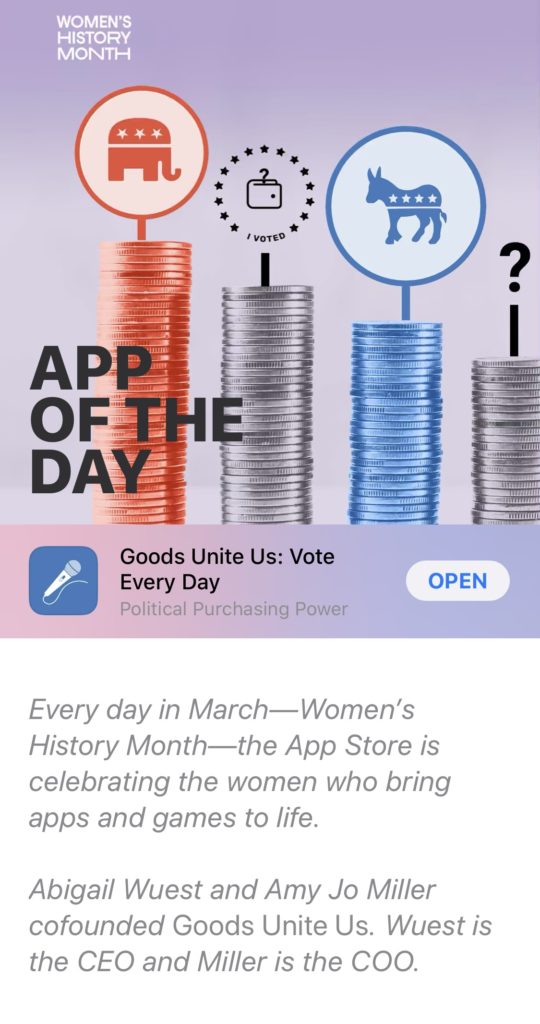
For over two years now, the Goods Unite Us team has relentlessly worked to continue to provide more transparency around corporate money in politics. We hand-curate all of our data and strive to uphold an organized and well-built platform for both consumers and brands. (Apparently Apple thinks so too)
The transparency and accountability we provide empowers consumers to vote with their wallets. We care about our democracy, and we hope you do, too! Download the Goods Unite Us app here. And if you’re a fan, please leave us a review in the app store (five stars is best).
The team at Goods Unite Us is honored and humbled to announce a major new partnership with one of the world’s top business review websites: Sitejabber.
San Francisco based Sitejabber was founded in 2008 with private funding and a National Science Foundation grant and has been described as “the Yelp for websites and online businesses.” The site now has over 3 million monthly visitors and includes reviews of over 100,000 businesses.
Consumers create Sitejabber accounts to rate and review online businesses using an overall star rating as well as criteria such as service, value, shipping, returns and quality. Beginning on February 17, 2020, if you research a company on Sitejabber, you’ll not only see consumer reviews and ratings, you’ll also see its political leanings:
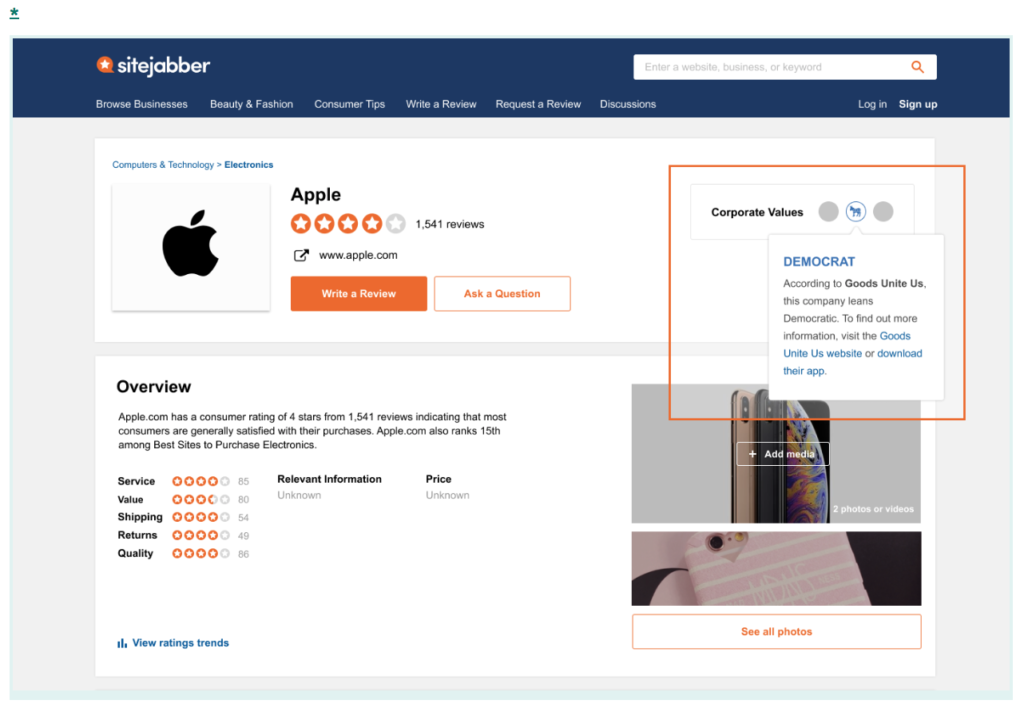
Truly, this is a partnership made in heaven! Sitejabber’s millions of users will now have access to our hand-curated political data on brands and companies. And Goods Unite Us will be able to further its mission of getting as many people to shop according to their politics as possible.
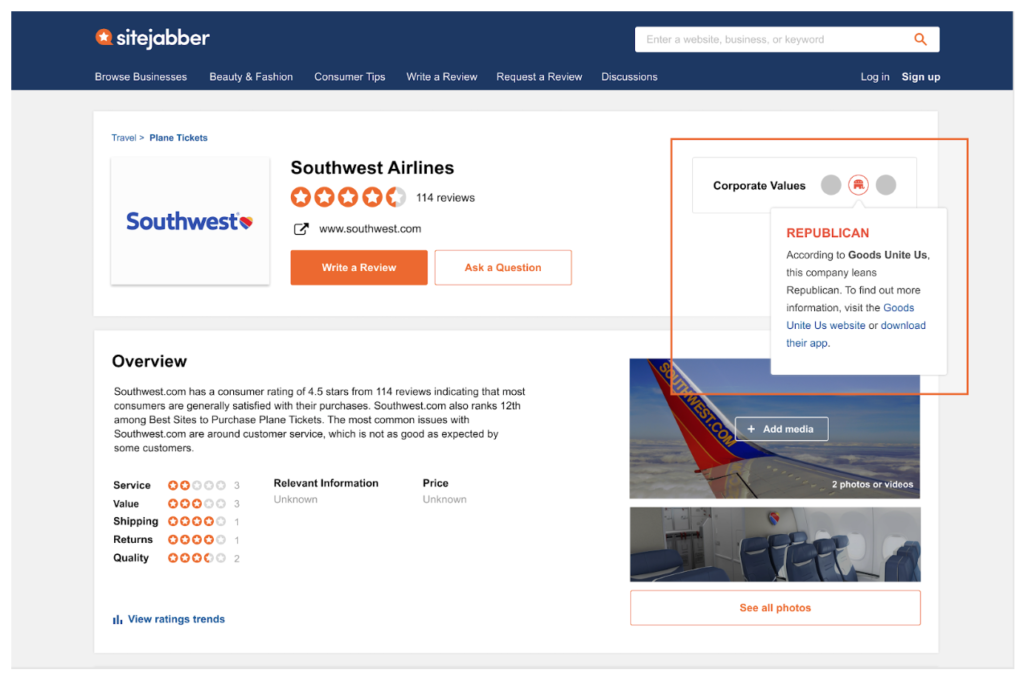
“Consumers today expect more than just great products and customer service. They want to know that the businesses they support align well with their values,” says Michael Lai, CEO of Sitejabber. “We are excited to partner with Goods Unite Us to help discerning consumers understand the political and societal impact of their purchasing decisions.”
“Sitejabber’s mission to help consumers make more informed purchasing decisions closely aligns with Goods’ mission of helping consumers put their money where their vote is,” says Abigail Wuest, Goods’ CEO. “This partnership with Sitejabber is one more step to normalizing consumers making conscious, educated and informed purchasing decisions.” says Amy Miller, COO of Goods Unite Us.
For over two years, the small but mighty team at Goods Unite Us has been working hard to provide consumers with political data on brands and companies. They’ve spent tens of thousands of hours vetting and doing research on companies, and Goods’ metrics prove that consumers are hungry for this information.
In fact, studies by research companies like Cone Communications have shown that 87% of consumers will purchase a product based on their values and 76% will boycott a brand if it supported an issue contrary to their beliefs. Over the years, both consumers and companies have seen this play out with major brands like Soul Cycle, Hobby Lobby, and Chick-Fil-A.
The bottom line is that both Goods Unite Us and Sitejabber are thrilled with this partnership. The more information in the hands of consumers, the better.
Conscious consumers like to pride themselves on supporting companies that align with their personal values, ethics and political preferences. Sometimes, it’s obvious. For example, Patagonia’s progressive perception is proven by 100% of its contributions going to Democrats, according to the Goods Unite Us mobile application. But often it’s not clear which political party a company supports. And in many cases, companies have a reputation that is actually inconsistent with its political contributions. The difficulty consumers can face in evaluating the political leanings of brands and companies is demonstrated in “The most popular companies in America, ranked by partisan leaning,” a recently released article by Axios.
For example, Under Amour, despite being 7.1% more favorable by Republicans, actually along with its senior employees sends a staggering 86% of donations to Democrats! To a lesser extent, Walgreens and its senior employees lean left in contributions with 54% of donations to Democrats, despite being more favorable among Republicans.
And Target, who is 13.6% more favorable among Democrats, barely leans right in its donations, with 51% heading toward Republicans.
While consumers struggle to decipher the politics of these companies, the contributions of many companies actually do align with what the public would expect. For example, Google and Starbucks are far more liked by liberals and they, along with their senior employees, donate overwhelmingly to Democrats, at 75% and 91%, respectively. On the other hand, Republicans greatly favor Chick-fil-A and Papa John’s, who along with their senior employees send 81% and 96% of donations to the conservative party.
Many companies that are universally favorable, and equally so among both Democrats and Republicans, happen to lean left. These companies include Netflix (98%), Apple (92%), Walt Disney (78%), and Amazon (67%).
Grocery stores seem to be one of the least transparent industries when it comes to political activity, as Wegmans (78% to Democrats) and Publix Super Markets (86% to Republicans) both receive equal favorability among those on the right and left. In fact, both are among the most highly reputable brands according to the public.
Frankly, it can be difficult to tell which way companies lean by simply looking at consumer perception or even popular media. That’s why you should download the Goods Unite Us app today!
The short answer is: not very often.
At Goods Unite Us, one of our missions is to get corporate money out of politics. And to that end, we’ve created on our website and app what we call our Campaign Finance Reform Score for brands and companies. If you want to read more about how that score is calculated, please go here. It’s on a scale of -100 to +100, the higher the score, the more likely your purchase is helping to support campaign finance reform (and vice versa).
One of the common complaints we get from users is that our scoring is biased against Republicans. If you glance at our scores, you’ll notice that brands and companies that donate in a higher percentage to Republicans generally have lower scores (and often their scores are negative). The reason this happens is because our scoring takes points away BOTH when a company or brand supports Republicans more than Democrats AND based on how much money is donated to both parties combined.
The only way to get a perfect score of 100 is to not donate at all. But, for example, if Company A and its senior employees donate $1 million to just Democrats and Company B and its senior employees donate $1 million to just Republicans, Company B will have a lower score. Hence, some users have said that our scoring is partisan.
Well, in response, we did some research. And it turns out approximately 89% of Republicans voted against the last major campaign reform bills, while approximately 92% of Democrats supported them.
Let’s start with the DISCLOSE Act (Democracy is Strengthened by Casting Light on Spending in Elections Act), which was introduced in 2010. Here was the voting breakdown:
House: Total Yes = 219 (217 Democrat — 2 Republican)
Total No = 206 (36 Democrat — 170 Republican)
Senate: Total Yes = 59 (59 Democrat — 0 Republican)
Total No = 39 (39 Republican — 0 Democrat)
Similarly, all the way back in 2002, there was the Bipartisan Campaign Reform Act. And here was the breakdown of the voting on that bill:
House: Total Yes = 240 (198 Democrat — 41 Republican — 1 Independent)
Total No = 189 (12 Democrat — 176 Republican — 1 Independent)
Senate: Total Yes = 60 (48 Democrat -11 Republican — 1 Independent)
Total No = 40 (39 Republican — 0 Democrat)
In total between these last two major campaign finance reform bills, there were 522 Democrat “yes” votes, and 48 “no” votes. Meaning 92% of Democrats voted in favor of the campaign finance reform bills. On the Republican side, 89% voted against the bills.
Now there is HR 1, the first bill the new Democrat House plans to introduce. We’ll be curious to see how the voting stacks up for that bill this January.
Of course, our plan is to eventually tweak our scoring based on each particular candidate’s views on the issue. So, for example, if Apple donates money to a Democrat that does not support campaign finance reform, Apple will lose points. But delving into that kind of detail takes time (and money), two things that we, as a small startup, don’t have a lot of at the moment.
However, based on our research, using political party as a proxy for the time being seems pretty reasonable to us. Hopefully it does to you too.
See The Political Affiliations Of Thousands Of Brands And Companies!
Is your favorite company red or blue? Does it fund Donald Trump, Mitch McConnell, Elizabeth Warren, or Joe Biden? Just download our FREE app by clicking here to find out.
It’s the highest rated political app in the app store (4.7 out of 5 stars). Hundreds of thousands of Democrats and Republicans have downloaded it already!
How It Works
Enter a company name. And the app will tell you the political donations made by the company and its senior employees. See information on Apple, Walmart, Patagonia, Koch, AARP, New Balance, Starbucks, AT&T and thousands more!
The app has information on clothing brands, home goods, cars, restaurants, universities, sports teams, and much more. You can also debate politics with other users.
Download it for FREE now!!!
People are curious about where companies and brands stand politically, and we tell them in an easy to use format (that’s very addicting). Since we launched our free political iOS app last November, over 12,000 people have used it (for an average session time of nearly 5 minutes!).
Our data is hand-curated, so you can trust it. Our researchers first figure out the parent company or companies of thousands of brands. And then they figure out how much money those companies and their senior employees collectively contribute to politicians and PACs, so you can easily figure out where your money goes when you purchase things. Finally, we input all of this information into our secret algorithm and voila — the result is our popular Campaign Finance Reform Score for each company and brand (which you can read more about here).
Now that our user base has grown we thought it’d be interesting to see which companies our users are looking at the most. What we found was a bit surprising. The names of the most viewed companies did not necessarily surprise us; what surprised us was the fact that out of nearly 4,000 brands and companies in our database, some of our top companies were looked at by a high percentage of all of our users.
That means these brands and companies need to start thinking about, and managing, their political profiles more closely. Because consumers care about what they’re doing — a lot.
So, without further ado, here are the top 25 most viewed companies and brands on our iPhone app:
Most Viewed Companies/Brands
(1) AT&T
(2) Amazon
(3) AMC Theaters
(4) Ace Hardware
(5) Apple
(6) Target
(7) Abercrombie & Fitch
(8) Costco
(9) Starbucks
(10) Airbnb
(11) Wal-Mart
(12) Home Depot
(13) AOL
(14) A&S Brewing
(15) Nike
(16) Chick-Fil-A
(17) Trader Joe’s
(18) McDonald’s
(19) Verizon
(20) Lowe’s
(21) Charmin
(22) Angel Soft
(23) Whole Foods Market
(24) New Balance
(25) Hobby Lobby
If you’re curious about where a particular company or brand stands politically, we encourage you to download our free app. And now you can also figure out your own Campaign Finance Reform Score by taking our Rate Yourself function within our app and on our website.
It’s entertaining, and the results might surprise you!
With just two months until the midterm election, many of our readers are gearing up to vote for their respective candidates. This is great because voting is the bedrock of our democracy. Behind the scenes, however, a lot of brands and companies are contributing a lot of money to politicians and PACs, and our job at Goods Unite Us is to make sure consumers know what their favorite brands and companies are doing.
To that end, this post will focus on the top 25 Democrat companies based on how much they and their senior employees give to Democrats. (We’ll focus on the Republican companies in another post.)
Without further ado…
here are the top 25 Democrat companies ranked by total amount given
1. Time Warner (CFR Score = 63)
2. DreamWorks (CFR Score = 70)
3. Saban Capital Group (CFR Score = 70)
4. Walt Disney (CFR Score = 62)
5. Paul, Weiss, Rifkind, Wharton & Garrison (CFR Score = 65)
6. Apple (CFR Score = 65)
7. Centerbridge Partners (CFR Score = 70)
8. AECOM (CFR Score = 61)
9. Zumiez (CFR Score = 70)
10. Kaiser Foundation Group (CFR Score = 65)
11. Latham & Watkins (CFR Score = 60)
12. Bloomberg LP (CFR Score = 68)
13. Manchester United (CFR Score = 70)
14. Aramark (CFR Score = 69)
15. Harbor Freight Tools (CFR Score = 70)
16. Sony (CFR Score = 61)
17. Netflix (CFR Score = 69)
18. Arnold & Porter (CFR Score = 61)
19. Salesforce.com (CFR Score = 65)
20. Quinn Emanuel Urquhart & Sullivan (CFR Score = 65)
21. Emerson Collective (Goods Score = 70)
22. Cleary Gottlieb Steen & Hamilton (CFR Score = 69)
23. Schulte, Roth & Zabel (CFR Score = 68)
24. Paul Hastings (CFR Score = 65)
25. Nimeks Organics (CFR Score = 30)
Curious how we determine a company’s Campaign Finance Reform Score? Read up on it here.
We hope that you’ll take this information and shop in accordance with your political beliefs so that you are not inadvertently supporting (or not supporting) brands and companies that align with your beliefs.
If you enjoy our posts, please consider voting for Goods Unite Us for the Wisconsin Innovation Awards. We want to keep giving you information you can use every day!
On July 25, 2018, at a demo day in front of a room full of investors in Silicon Valley, California, Goods Unite Us released a free, first-of-its-kind rating tool that allows users to see how their own purchasing habits impact politics.
The tool is available here.
To use it, you just need to answer ten questions about your own purchasing habits (where you shop for groceries, what kind of car you drive, where you bank, where you buy clothes, etc.). And then the tool uses average consumer spending data and our database of political information on nearly 4,000 brands and companies to calculate whether your purchases are helping Democrats, Republicans or both!
If you’ve read our blog before, you know that Goods Unite Us currently maintains a free website and iOS app that includes political donation information for nearly 4,000 brands and companies.
Each brand and company page provides users with information about where the company/brand and its senior employees donate money. For example, here are the pages for Angel Soft and Apple:
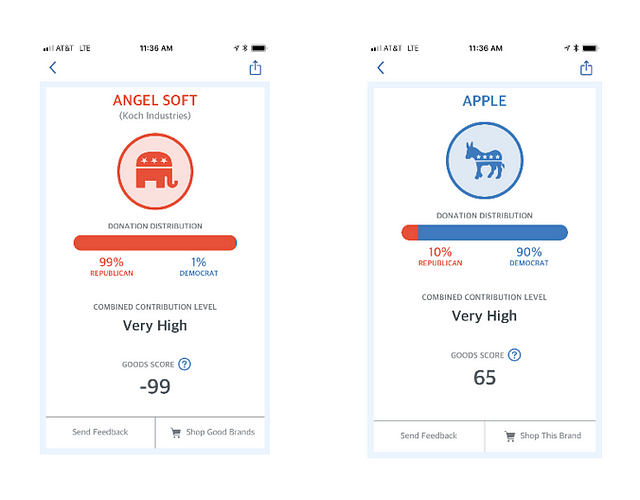
Now, instead of just rating companies, we’ve created a way for everyone to rate themselves. Answer the questions, and we’ll provide you with your percent Democrat/Republican breakdown and a Campaign Finance Reform Score (which you can read more about here). Your ratings will look like this:
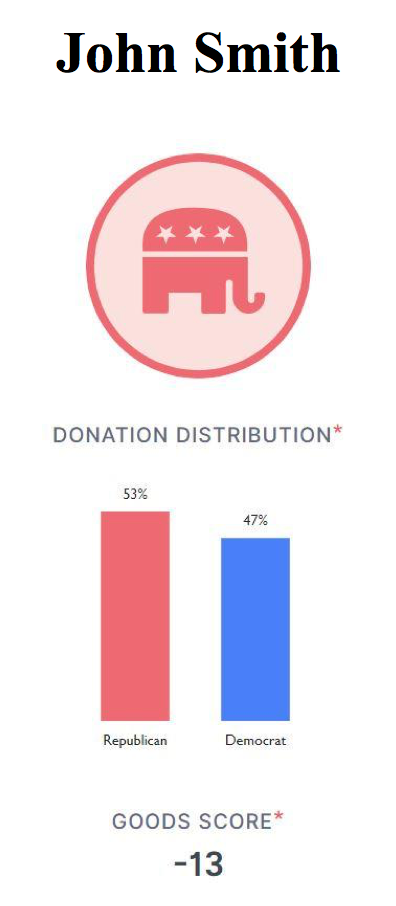
And in the next few weeks, we’ll be rolling out features that give users tips on how to best change their ratings if they don’t like them. So, for example, if you’re a Republican but your purchases help Democrats, we’ll tell you what areas of your spending (credit cards, phone companies, etc.) are most impacting your percentage breakdown and Campaign Finance Reform Score. And we’ll recommend some companies that you can support instead of the ones you’re currently purchasing goods or services from to help change your ratings.
At Goods Unite Us, our mission is to provide more transparency around corporate money in politics. And now — not only can you use our website and app to see who companies and brands are supporting — you can more easily take matters into your own hands!
